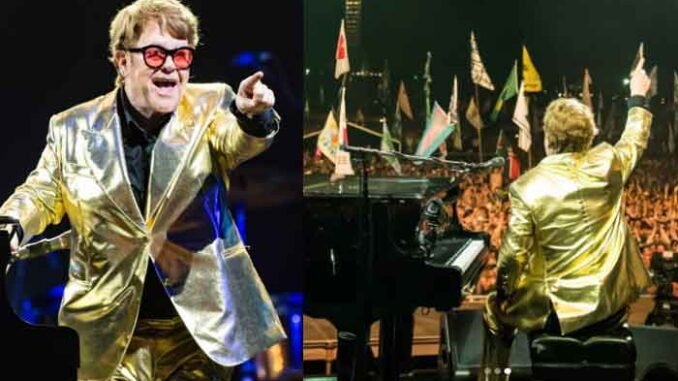
No one who filed out of the storied hall that night could quite remember how they got back to the street. People wandered like sleep-walkers, trading smiles with strangers, clutching programmes as if they were relics. London’s mist—which only hours before had felt damp and ordinary—now shimmered, charged by whatever invisible current had just passed through 5,272 souls. “It wasn’t a gig,” a gray-haired man whispered to a reporter. “It was a benediction.” Outside the stage door, where velvet ropes usually separate fans from stars, the barrier had dissolved. Musicians, technicians, ushers, and ticket-takers stood in one loose circle, dabbed at red eyes, and spoke in the hushed tones normally reserved for cathedrals.
Inside, long after the audience had gone, the stage remained lit. Paul McCartney wandered to the lip, looking out at rows of empty crimson seats. His Höfner bass still hung from his shoulder, the strap damp with sweat and maybe something more. A single stagehand asked whether he should power down the rig. McCartney shook his head. “Let’s leave the lights on a minute, mate,” he murmured. “She’s never looked more beautiful.” A few feet away, Eric Clapton sat cross-legged, guitar across his lap, fingers idly tracing a phrase that sounded curiously like a lullaby. He was smiling, but tears clung stubbornly to his beard. Every so often he’d glance at the spot where George Harrison had once bent notes into the roof of this hall, and the corners of his mouth would tremble.
Backstage, Elton John peeled off his bejeweled jacket—tonight’s only concession to flamboyance—and draped it over a flight case. “Stripped down,” he joked earlier at sound-check. “If you can call a twenty-foot Bösendorfer stripped.” His grand piano had been tuned twice in one night, not out of necessity but precaution; a single sour note would have shattered the atmosphere they’d hoped to conjure. Elton now approached Sting, who was fussing with the set list as if an encore might materialize. “Mate,” Elton said, “you floated that harmony like incense.” Sting, still barefoot from having kicked off his shoes mid-song, laughed. “You anchored the planet,” he replied. “Someone had to keep us from levitating.”
What no one in the crowd knew was how perilously close the evening had come to unraveling. Just hours before curtain, the quartet discovered that the in-ears they’d been issued ran on different frequency ranges. Paul wanted no click track—“There’s a heartbeat inside this song already”—while Elton insisted on one rehearsal with it, just to lock tempi. Clapton, nursing a tender finger joint, asked for monitors at half volume; Sting preferred them loud enough to “feel the ribs rattle.” The compromise, hammered out over herbal tea and jokes about being “impossible old codgers,” was simple: ditch the technology. They would play exactly as they had learned to play half a century ago—by watching one another’s eyes and trusting the song to carry them.
The charity at the heart of the evening—Music Minds, a foundation funding mental-health services for touring musicians—had requested “something iconic, something communal.” There had been talk of “Let It Be,” or maybe “Your Song” melting into “Tears in Heaven.” Yet when the first rehearsal unfolded in a nondescript warehouse near Heathrow the previous week, McCartney tried a gentle vamp on F major and four syllables slipped out almost accidentally: “Hey… Jude.” The others joined before thinking. By the final refrain, every roadie, caterer, and security guard in the building was singing. Decision made. Contracts amended. Lighting plots rewritten to accommodate a single, transcendent number stretched to ten glorious minutes.
Those ten minutes felt outside of time. It began with Paul alone in a tight spotlight, his voice weathered but resolute, tilting into the first verse. On the second line, Elton’s piano unfurled like silk, choosing restraint over fireworks. By the middle eight, Clapton stepped forward, guitar tone soaked in organ-like sustain, offering phrases that seemed to plead and console simultaneously. Then Sting, eyes closed, slipped above the melody, not overpowering but adorning it with what McCartney later called “a halo made of breath.” When they reached the Na-nas, the hall cracked open. Ushers abandoned posts, press photographers lowered cameras, and rafter-level fans swore they could hear the wood in their seats resonating. The last chord rang so long that even the chandeliers appeared to tremble.
Social media lit up in real time, but for once the screens felt like extensions of awe, not distractions from it. A viral clip captured a middle-aged man in row K—an ex-paratrooper, according to the profile that later surfaced—crying openly. “I didn’t care who saw,” he tweeted. “We spend our lives acting tough. Tonight I learned the bravest thing you can do is sing from your wounds.” Within hours, that sentence was trending worldwide, translated into seventeen languages, printed on impromptu T-shirts, and projected onto the Sydney Opera House sails.
The four legends finally drifted to the green room, conversation tapering into companionable silence. A lone runner entered to ask whether they wanted car service. “Give the drivers the night off,” Clapton said, strumming a muted chord. “We’ll walk.” And so they did: out a side door, down the stone steps, and onto Kensington Gore, where a mist still lingered and a handful of stragglers gasped. No entourage, no paparazzi scrum—just four men who had spent their lives on pedestals, strolling shoulder to shoulder beneath the same streetlamps as everyone else.
At the corner, under a traffic light stuck on amber, they paused. Birds—confused by the hour or perhaps stirred by the music—chirped from plane trees overhead. Paul looked up, smiled, and hummed a final “Na-na-na.” Elton joined, harmonizing a third below. Sting chuckled, but fell in. Clapton, his voice rarely heard in song, supplied the bass. One last chord drifted into the London night, mingled with the city’s heartbeat, and was gone. As they parted ways, not one of them said goodbye. Some songs, like some moments, never really end.
Leave a Reply